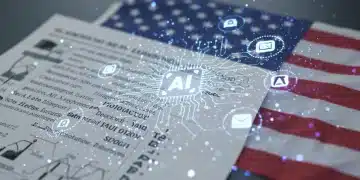Expert breakdown on AI chip export controls 2025
AI chip export controls regulate the distribution of advanced chips to ensure national security and ethical usage, significantly impacting technology innovation and global collaboration.
Expert breakdown on AI chip export controls 2025 provides crucial insights into how emerging regulations reshape the tech landscape. Have you considered how these controls may affect innovation and competition? Let’s dive in.
Overview of AI chip export controls
Understanding the overview of AI chip export controls is vital as we navigate the fast-evolving technology landscape. These regulations are designed to control the flow of advanced technology across borders, impacting governments, companies, and researchers alike.
Purpose of AI Chip Export Controls
One key aspect of these controls is national security. Oftentimes, chips used in AI are considered sensitive technology. By managing their export, countries aim to prevent them from falling into the wrong hands. This is particularly crucial as tensions rise in global politics.
Impact on Innovation
Such regulations can also impede innovation. When companies face barriers to exporting their products, it can slow down research and development. Here are some potential impacts:
- Increased costs for technology development.
- Limitations on collaboration with international partners.
- Slower pathway for advancements in AI.
- Market monopolization by companies that can navigate these controls.
In many cases, businesses must adapt their strategies to comply with these regulations. This includes revisiting supply chains and seeking new partnerships. As a result, flexibility becomes essential in the face of shifting regulations.
Global Response to Export Controls
Countries respond to AI chip export controls in various ways. Some nations are tightening their regulations, while others are advocating for more open trade. This divergence can create a complex environment for tech companies. It forces them to keep up with changes in policy, which can be challenging.
Overall, the landscape of AI chip export controls is constantly changing. Keeping informed about these regulations is crucial for staying competitive in the tech industry. As the controls evolve, so too must the strategies of companies and researchers working with AI technologies.
Impacts on global tech industry

The impacts on the global tech industry caused by AI chip export controls are profound and far-reaching. Understanding these impacts is essential as they shape the future of technology innovation and competition.
Market Adjustments
With regulation changes, tech companies must quickly adjust their market strategies. They may face limitations on exporting essential components needed for their products. This can lead to:
- Higher costs of production due to limited supply.
- Encouraged local manufacturing to avoid export challenges.
- Potential delays in product launches and updates.
These changes can disrupt planned innovations, putting companies at a disadvantage compared to competitors who navigate these regulations more effectively.
Effects on Research and Development
Furthermore, research and development are likely to suffer. When access to AI chips is restricted, research initiatives can stall. Researchers must adapt their projects or seek alternative components, which may not meet their original goals. This could hinder advancements in AI technology and prolong the time it takes to develop new solutions.
The collaboration between countries can also be negatively affected. With tighter controls, partnerships that spur innovation may become rare, resulting in less knowledge sharing and slower progress across the board. The international tech community must find ways to work around these barriers for the good of global innovation.
Regional Disparities
Another significant impact involves regional disparities in tech development. Countries with stricter export controls may see their domestic companies suffer, while nations with fewer restrictions thrive. This divergence can create a competitive imbalance globally.
Tech demand continues to grow, but supply constraints from export regulations may push prices up. Ultimately, the ability of companies to invest in new technologies will be significantly challenged, leading to potential stagnation in progress and innovation.
Key players and their strategies
Understanding the key players and their strategies in the realm of AI chip export controls is crucial for navigating the complex landscape of global technology. Major companies, governments, and regulatory bodies each have unique approaches that shape the future of the industry.
Leading Companies in AI Chips
Several tech giants dominate the AI chip market. These companies actively lobby for favorable trade regulations to maintain their competitive edges. Some of the leading firms include:
- NVIDIA, known for its advanced GPUs.
- Intel, focusing on processing power and innovation.
- AMD, which aims to enhance performance with cost-effective solutions.
These companies not only influence market trends but also develop technologies that comply with current export controls. They often invest in research to create adaptable products that match regulatory requirements.
Government Roles and Regulations
Governments play a pivotal role in enforcing export controls on AI chips. Their strategies can determine how companies operate. For instance,
- Countries may impose strict regulations to protect national security.
- Some governments incentivize local production to reduce dependency on foreign suppliers.
- Trade agreements can either ease or tighten restrictions based on diplomatic relations.
The interplay between government policies and corporate strategies creates a dynamic environment where adjustments are necessary. Companies must stay informed about policy shifts and take proactive measures to adapt.
As the tech landscape evolves, collaborations between the private sector and government agencies become essential. By working together, they can help advance technologies while ensuring compliance with export regulations.
Future trends in AI chip regulation

Future trends in AI chip regulation are set to transform the technology landscape significantly. As artificial intelligence continues to evolve, so too will the rules governing technology exports and production.
Evolving Regulatory Frameworks
One major trend is the development of more comprehensive regulatory frameworks. Governments are increasingly aware of the need for clear guidelines. This ensures companies understand their responsibilities. As regulations become more structured, companies can better adapt and plan their strategies.
International Collaboration
Another important direction is the push for international collaboration. Many nations recognize that addressing global challenges requires working together. International agreements may emerge to standardize regulations, making it easier for companies to navigate different markets. This can lead to:
- Shared best practices among countries.
- Stronger partnerships in research and development.
- Reduced barriers to innovation.
Such collaborations will foster a more unified approach toward AI chip export controls, encouraging innovation while maintaining security standards.
Technological Innovations Impacting Regulation
Advancements in technology will also shape regulations. As AI capabilities expand, there will be increased scrutiny on how chips are used. Regulators may implement specific guidelines to address ethical concerns and risks associated with AI. This will lead to:
- More transparency in the use of AI technologies.
- Stricter compliance requirements for companies.
- Focus on ethical AI usage and deployment.
Ultimately, the future of AI chip regulation will require manufacturers and governments to work closely together. Staying ahead of these trends is essential for companies looking to thrive in a rapidly changing environment.
FAQ – Frequently Asked Questions about AI Chip Export Controls
What are AI chip export controls?
AI chip export controls are regulations that govern the export of advanced artificial intelligence chips to ensure they don’t fall into the wrong hands.
How do AI chip export controls impact tech companies?
These controls can limit access to crucial technology, slow down innovation, and increase production costs for companies relying on AI chips.
Why is international collaboration important in AI chip regulations?
International collaboration helps create standardized regulations, making it easier for companies to operate across different markets while ensuring security.
What future trends can we expect in AI chip regulation?
We can expect more comprehensive regulatory frameworks, increased scrutiny on ethical AI usage, and a push for international cooperation among countries.





